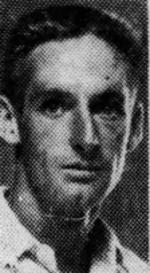 The Tampa Tribune, September 18, 1965. A Kwik Serve store in the small city of Mulberry in Polk County, Florida, was held up around 11 p.m. on March 11, 1965. The assistant manager, Emogene Conley, and clerk, Mary Ann Caveney, were both present during the armed robbery. Patrolman Dale Kelley, the police escort who typically came to the Kwik Serve every night at closing time, had stepped out of the store to check out a suspicious car at the time of the robbery, so Kelley was not a witness to the crime. Conley and Caveney both noted the robber’s “very blue eyes” and reported having clearly seen his face. After Conley and Caveney did not identify the robber in any of the police photo books that they viewed, a police deputy drove to their homes to show them a photo of blue-eyed 24-year-old plasterer Robert Lamar Watson. Watson had been placed on probation four years earlier, after he and several friends had been involved in an auto theft and arson charge. Watson had not been in trouble with the law since that time. Recalling that Watson fit the description of the robber, officers had dug out this old photo of him. The two witnesses identified Watson as the robber after viewing the photo. Although Watson was able to provide several witnesses to confirm his alibi that he was at his home, 97 miles from Mulberry, at the time of the robbery, he was quickly convicted on June 2, 1965 based on the eyewitness testimony. However, just weeks after Watson was sent away to serve a ten-year sentence in prison, a nearly identical robbery occurred at another supermarket in Mulberry. The witnesses gave a highly similar description of the robbery and the robber himself. The investigation into the second robbery led to the arrest of 23-year-old Bertram Dale Durden. Not only did Durden confess to both robberies, he also stated that three local police officers had been involved in the crimes. One of the police officers implicated by Durden was Patrolman Dale Kelley, the Kwik Serve escort, who soon pled guilty to conspiracy to commit robbery. The police chief, Horace Branch, was one of the other two officers implicated in the crimes. An investigation by The Tampa Tribune helped bring the injustice of Watson’s conviction to light. On September 9, 1965, Watson was released on bond. Watson’s new attorney, Manuel M. Garcia, who was representing him pro bono, filed a motion to vacate and set aside Watson’s conviction. The judge quickly granted this motion, at which time the County Solicitor, Gordon McCalla, filed a notice of nolle prosequi, dismissing the charges against Watson on September 17, 1965. In June 1967, the Florida state legislature awarded Watson $15,000 as compensation for his six months of wrongful incarceration. – Meghan Barrett Cousino
|